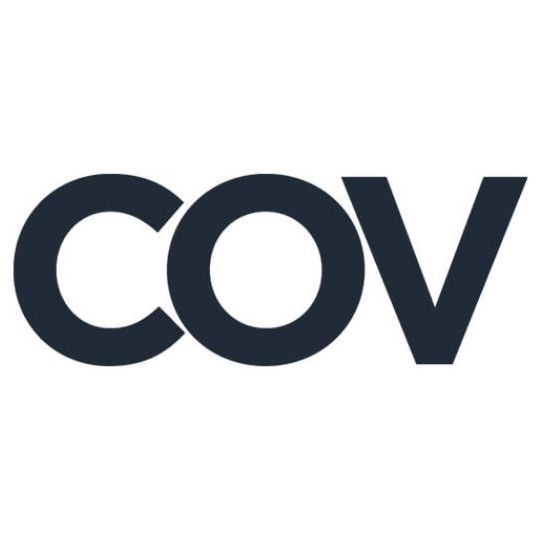[vc_row][vc_column][vc_column_text]

[/vc_column_text][/vc_column][/vc_row][vc_row el_class=”hero-header-text”][vc_column][vc_column_text]
That’s Life
What you might not know about one of the largest churches in the United States. A conversation with Craig Groeschel and Gary Walter
May 16, 2018
[/vc_column_text][/vc_column][/vc_row][vc_row][vc_column][vc_column_text]
Life.Church pastor Craig Groeschel and ECC president Gary Walter recall the beginnings of a Covenant church plant in 1996 that has become the largest multi-site network in the U.S. Walter was director of church planting at the time, and Groeschel a twenty-eight-year-old associate pastor in Oklahoma City just finishing seminary. Today Life.Church has touched millions of lives through its twenty-nine locations in nine states, development of the YouVersion Bible app downloaded 325 million times around the world, and the free distribution of resources to thousands of churches. Recently Craig and Gary talked about those early days, Craig’s passion for evangelism, how Life has managed to stay true to its values through it all, and how innovation is rarely planned.
Gary Walter: I am always intrigued by how God uses relationships to position people in ministry. The Covenant was just getting started in Oklahoma with two churches, Redeemer Covenant in Tulsa with Bill Clark and Westmoore Community Covenant in south Oklahoma City with Paul Cunningham. You knew them both, plus your own Methodist pastor Nick Harris suggested you explore making the Covenant your vocational home. So it was out of those relationships that we first connected.
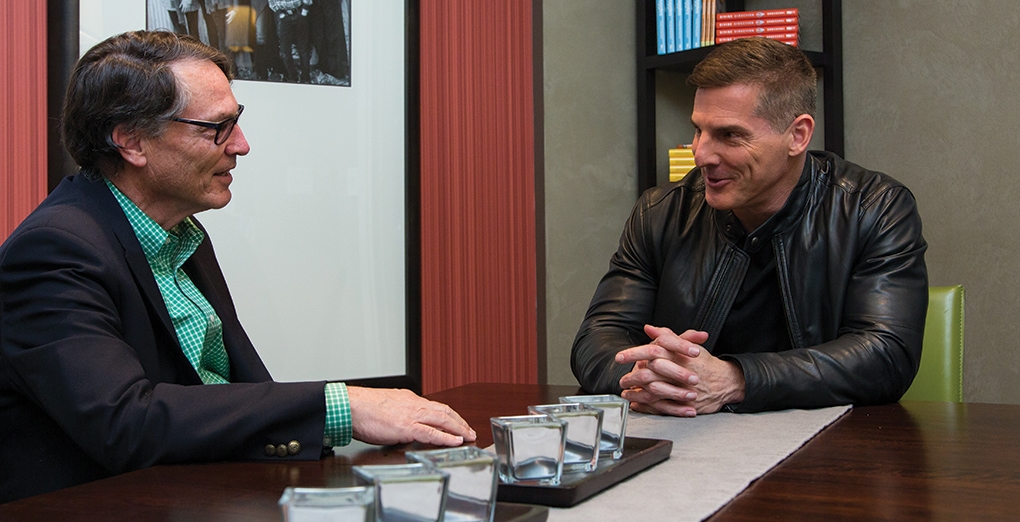
Craig Groeschel: Yes, we first met at a Denny’s restaurant. It was a snowy day and on my way there I tried to run my little Geo Prism through a car wash and it froze. Then I went to pump the gas and it wouldn’t work. When I got there, I couldn’t see and drove right on top of the parking curb. Not the best way to make an impression!
Gary: What attracted you to the Covenant?
Craig: Some things that stood out about the Covenant to me were a real commitment to the word of God, a sincere passion for evangelism, and a willingness to think outside the box. Mainly, the Covenant has a pure heart for the things that I think matter to the heart of God.
Gary: As things unfolded you were part of our church planting assessment process, and we signed a Covenant agreement to plant the church. We were just about to get started when something devastating happened.
Craig: We were planning to start in May of 1995. That date was just weeks away when the Murrah Federal Building was truck-bombed in a domestic terrorist attack by Timothy McVeigh, killing 168 people. I was an associate pastor at First United Methodist Church, which was directly across the street from the Murrah building. My office was directly in line with the bomb and was blown up along with parts of other surrounding buildings. A large shard of glass lodged in my desk chair. I was in a seminary class that morning, otherwise I probably would’ve been among the victims. I rushed to the church when I saw the news. We were able get into the building to get stuff out before they completely shut the downtown area. They were using our lobby as a makeshift morgue for the bodies. They told us, “Whatever you do, don’t look in the lobby.” Being twenty-eight at the time, I didn’t listen and glanced in for what might have been three seconds at the most. I saw the most horrible images that I’ll ever see in my life. The bodies didn’t even look like bodies. I’ll never forget those images.
Gary: And that directly impacted your vision for the church plant.
Craig: That made my drive for evangelism even more real, more critical. Most everyone in Oklahoma City either knew someone who lost their life or knew someone close to someone who lost their life. We saw that not only is life brief, but it was the beginning of a different era for our country. To this day we offer an invitation to follow Jesus at every single service on every single campus every single week.
Gary: We postponed the start of the church plant for several months for you to minister through the pain and aftermath. Then came the first service—forty people in a garage. You closed that service with something that has become a core theme.
Craig: Whoever finds God finds life. It’s a truism of sorts from Scripture. The text of Proverbs 8:35 is, “Whoever finds me, finds life.” It’s actually referring to wisdom, but wisdom is rooted in God. I just said, “Whoever finds God, finds life!” To this day, at every service the pastor will say, “Whoever finds God,” and the people respond with, “finds life.” We end each service reminding people that life finds its purpose and fulfillment in God.
Gary: That is one of several foundational values at Life.Church. Something that impresses people about Life once they get to know it is just how pervasively your values frame your ministry. You can’t walk anywhere around your campuses without being reminded of them. That commitment dates to the very beginning.
Craig: Back in December of 1995 we sat in a living room with seven people and came up with about eight values, seven of which are still in place today. I don’t want values just written on a wall, I want values in our hearts. We worked to wordsmith them in a way that would stick. It was probably a fifteen-year process before they were all honed. We’ve just made them sound a little better.
Rather than just a word, I wanted statements that are sticky, memorable, and create emotion. If your values don’t move you, they’re too dry. If you can’t remember them, they’re not going to do any good.
At the top of the list is evangelism. We want to be radical about reaching people for Christ. We also talk about being spiritual contributors, not just consumers. We often come into a church looking for what the church can do for us. We want people to understand that we are God’s church and we exist to serve.
[/vc_column_text][/vc_column][/vc_row][vc_row][vc_column][vc_column_text]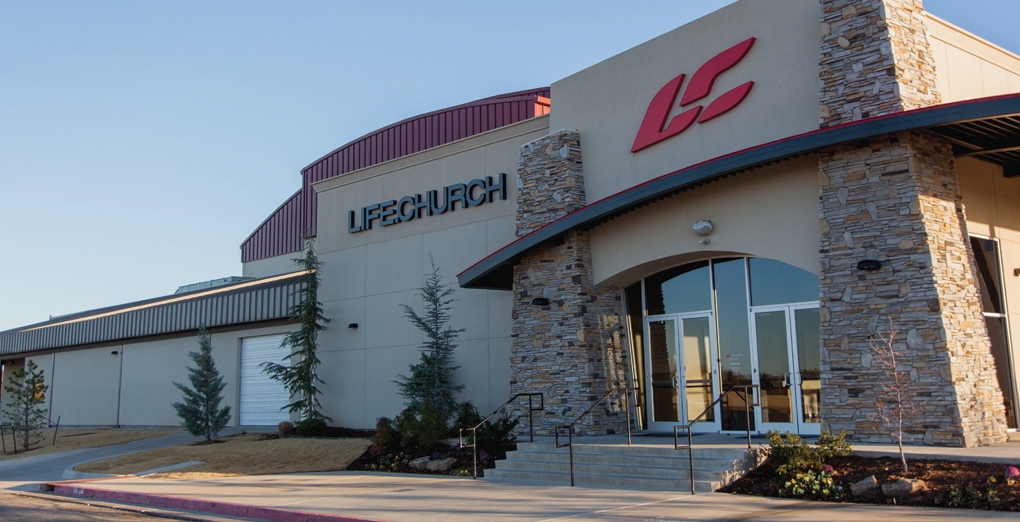 [/vc_column_text][/vc_column][/vc_row][vc_row equal_height=”yes” css=”.vc_custom_1526414480325{background-color: #efefef !important;}”][vc_column width=”1/2″][vc_column_text]
[/vc_column_text][/vc_column][/vc_row][vc_row equal_height=”yes” css=”.vc_custom_1526414480325{background-color: #efefef !important;}”][vc_column width=”1/2″][vc_column_text]
How Life Lives
We will honor Christ and his church with integrity. If we live with integrity nothing else matters. If we don’t live with integrity nothing else matters.
We will do anything short of sin to reach people who don’t know Christ. To reach people no one is reaching we’ll have to do things no one is doing.
We always bring our best. Excellence honors God and inspires people.
We give up things we love for things we love even more. It’s an honor to sacrifice for Christ and his church.
We are spiritual contributors not spiritual consumers. The church does not exist for us. We are the church and we exist for the world.
[/vc_column_text][/vc_column][vc_column width=”1/2″][vc_column_text]
We are faith-filled, big-thinking, bet-the-farm risk takers. We’ll never insult God with small thinking and safe living.
We will lead the way with irrational generosity. We truly believe it is more blessed to give than to receive.
We are all about the “capital C” Church. The local church is the hope of the world, and we know we can accomplish infinitely more together than apart.
We will laugh hard, loud, and often. Nothing is more fun than serving God with people you love.
We wholeheartedly reject the label mega-church. We are a micro-church with a mega-vision.
[/vc_column_text][/vc_column][/vc_row][vc_row][vc_column][vc_column_text]
Gary: Life has always been a learning and innovating organization. I appreciate that you do not hold “how to” conferences, because you have said as soon as you begin to teach a model you lock yourself into that model and lose sight of new opportunities and fresh insights.
Craig: I think our first innovation was not wearing a tie, which was a big thing back then.
Gary: Against my advice! But many of the key innovations that are associated with Life were not really planned. They were inadvertent, arising from unforeseen circumstances. For example, there were no grand strategy sessions around leveraging technology or being multi-site.
Craig: Almost all of our innovations were accidental. For example, video teaching was a result of the fact that my wife, Amy, gave birth to our fourth child between Saturday night church and Sunday morning. I wasn’t going to go preach. No one else was ready to fill in, so we decided to just run the video from the Saturday service.
Our multi-site model also came about unintentionally. That started when we were turning people away. Someone suggested that we add a service in another location. We used a movie theater at a staggered time and shuttled back and forth in a car trying to time everything. And then another church called and asked me if I’d leave Life to pastor their congregation on the other side of town. When I declined they asked, “Is there anything we could do?”
Jokingly I said, “You could dissolve and become part of Life.” To our surprise thirty days later they voted to do just that. That was not something we planned. We don’t do that today, since any campus we have is one we start, but the point is, many times it has been unplanned circumstances that have sparked what-if conversations and experimentation.
Gary: YouVersion is another example.
Craig: YouVersion started out as an idea that failed. We tried to create a website to engage people in the Bible. Our goal was a combination of YouTube, Facebook, and the Bible, but it just didn’t work. We were about to pull the plug in 2007 when our innovation leader Bobby Gruenewald came in and said, “Apple’s coming out with something called apps. I think we could get this ready as a Bible app.” We had a nineteen-year-old kid who worked part-time and built something rudimentary. From the Thursday when it launched to Sunday, there were 81,000 downloads. So the nineteen-year-old went full-time the following Monday. Today there have been 325 million downloads worldwide in more than 1,000 languages, and over two billion minutes spent on the app.
[/vc_column_text][/vc_column][/vc_row][vc_row css=”.vc_custom_1526414498548{background-color: #efefef !important;}”][vc_column width=”1/2″][vc_column_text]
Spreading the word
Created as an offshoot of a failed Life.Church project, YouVersion became Apple’s first Bible app and is now available for free around the world in more than 1,000 languages, with 325 million downloads to date.
[/vc_column_text][/vc_column][vc_column width=”1/2″][vc_column_text]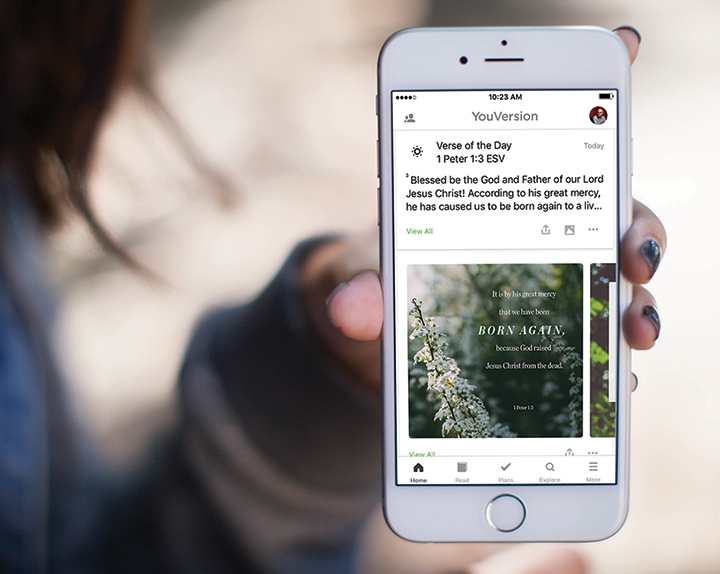 [/vc_column_text][/vc_column][/vc_row][vc_row][vc_column][vc_column_text]
[/vc_column_text][/vc_column][/vc_row][vc_row][vc_column][vc_column_text]
Gary: At your size and complexity now, is it even possible to keep an innovative edge?
Craig: People ask about our five-year vision. The world is changing so fast now that there’s no way we can predict what’s coming in five years. So we want to create margin—financial, emotional, leadership, and time margins—for opportunities that we cannot predict. God will bring an opportunity that if we don’t have the money for it, the resources, the time, the energy, we couldn’t do it. We want to create margin for that.
Then we always say everyone’s going to make mistakes. When we make mistakes, we’re going to make aggressive ones, not passive ones. When we make a mistake, it’s going to be trying something and learning from it. Not sitting back saying, “Oh, we should have tried that.” We’re always going to be pushing the envelope a little bit—the greatest innovations we’ve experienced were all accidents.
Gary: It is obvious you place a high value on hospitality, making people feel genuinely welcome. You can feel a sense of anticipation. And yet there is no soft-pedaling in your messages.
Craig: When we started, the seeker movement was really big. But I think some people misunderstood the seeker movement as something that presented a watered-down truth. Rather, we wanted a paradox where you simultaneously were comforted and confronted. We wanted people to say, “I feel welcomed here. I feel loved. I’m not afraid.” But while they are being comforted, they’re also being confronted with the transforming power of Scripture and the need we all have of a Savior. People know we take both them and Scripture seriously.
Gary: How important is that understanding to helping you navigate cultural polarization?
Craig: We have to be more pastoral and sensitive or we’ll lose our audience before we ever have a chance to have a conversation. It requires more than just the what, but also digging into the why. We don’t change the message, but we might change the way we get there.
[/vc_column_text][/vc_column][/vc_row][vc_row css=”.vc_custom_1526414538720{background-color: #efefef !important;}”][vc_column width=”1/2″][vc_column_text]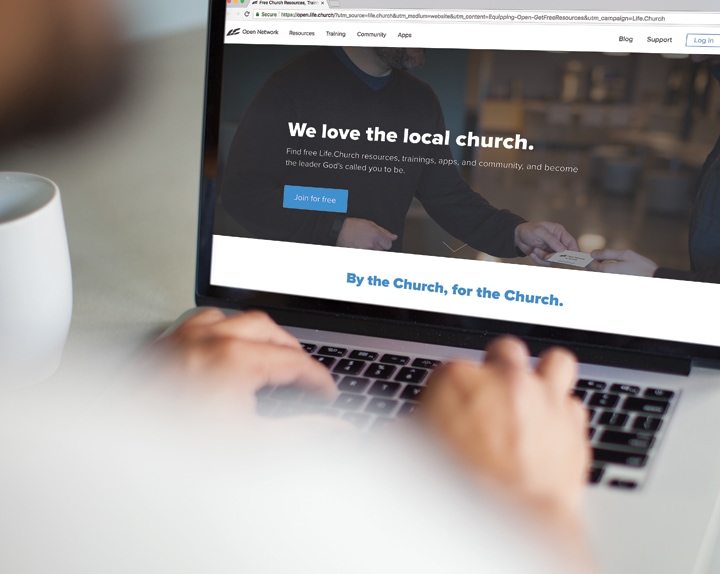 [/vc_column_text][/vc_column][vc_column width=”1/2″][vc_column_text]
[/vc_column_text][/vc_column][vc_column width=”1/2″][vc_column_text]
Generous Innovation
Life.Church’s Open Network gives away thousands of ministry resources, including downloadable graphics, Bible lessons, videos, and a variety of cloud-based applications designed to help churches and pastors.
[/vc_column_text][/vc_column][/vc_row][vc_row][vc_column][vc_column_text]
Gary: What would you say people from the outside don’t understand about Life?
Craig: Pastors and church leaders come in and think the key is technology or technique. They’ll ask what kind of video projector we use or how do you choose your locations—all the technical stuff. Technology is a tool that helps us scale the ministry but it’s not the key. The spiritual side is always the top priority. Without the Spirit of God, we have nothing. It’s God’s truth. It’s God’s power. And God works through people.
Another critically important thing is finding, developing, and empowering people—people, people, people. Then what do people do? People create the right culture. People create the right systems. People invest God’s resources in the right places.
Sometimes people think this multi-site model is about me as the leader—the guy on the screen. They have no idea how far that is from the truth. Our model lets our campus teams be pastors and ministry leaders without having to be concerned with all the time tied up in message preparation. That actually allows more time for personal engagement. When I visit another campus, I never get up on the platform. That would send a message that the “main person” is here. I would never do that. I just sit in the front row and support the people who are leading on that campus. It is less about me and more about other people who do the direct ministry with people.
Gary: I think another misconception might be not knowing that the Life network is more socioeconomically and ethnically diverse than people might suspect, as is the team of campus pastors, including female leadership. Multi-site allows you to reach into a variety of community contexts more than a single campus in a single location would.
Craig: True.
Gary: Craig, I’m grateful for you. You have lived with integrity, you have loved your family, you have cared for your staff and congregation, you and your team have unassumingly been used in ways no one could have imagined. For a long time you were the biggest church no one had ever heard of. That’s a compliment. This ministry has touched millions of people.
I tell people that one never knows what is being set in motion by any single act of faithfulness. We had no idea what was being set in motion when you and Amy said yes to church planting.
Craig: Well, thank you for investing in me and for your decades of faithfulness to God’s mission. You’ve been a spiritually balanced leader and a perceptive friend. You’ve been a voice of healthy caution without ever putting the brakes on us. When we were starting, I remember you said that people tend to overestimate what they can do in the short term but underestimate what they can do in the long run. That has been true. You also promised that in ministry I would be broken but would be better for it. Nothing has been truer for me in my journey.
[/vc_column_text][/vc_column][/vc_row]



